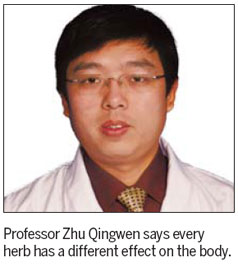Life
Doctor says there is no rumor with TCM aroma
(China Daily)
Updated: 2011-01-25 07:54
 |
Large Medium Small |
Q+A | Zhu Qingwen
Aromatherapy might have been around for years, but so too has a degree of uncertainty about whether smells really have curative powers over body and mind.
Providing METRO with some of the answers is Professor Zhu Qingwen, from the Beijing University of Chinese Medicine.
Does aromatherapy have a long history in China?
Certainly. In fact, aromatherapy is believed to have begun in ancient China some 2,000 years ago, as a form of herbal medicine.
There is mention of it in some very old books, such as Zhuangzi and Chu Ci. They describe how people burned herbs or carried perfumed bags to treat diseases and, more interestingly, to alter emotions.
Archaeological excavation also shows that aromatherapy containers were found in the tombs of Han and Tang dynasties.
Can plant extracts really influence our bodies?
Every plant has a natural function, but it also has its own fragrance.
According to traditional herbal theory, we can divide herbs into four types and five tastes.
These different classifications of herbs can generate distinct aromatherapy oils, which are able to stimulate body parts.
Which is the best way to release an aroma from oil? 
It depends. The art of aromatherapy has numerous techniques to get the plant's natural perfume into play.
Some plants can be heated or even burned, while others release their scent naturally.
Of course, if you don't respond well to the smoke caused by burning a plant, a much better practice is to gently warm some aromatherapy oil.
Apart from oils, how else can we perform aromatherapy?
A good method is to consult a traditional Chinese medicine doctor, who can advise on which herbs will meet your needs.
Some of these herbs can be placed inside a bag or even a pillow - in this case, the fragrance will penetrate the mouth, nose and facial skin as you sleep.
This style of aromatherapy can be tailored to benefit the body. On example of this is the use of garlic, cinnamon and pieces of Whiteweed, since they can slow the symptoms of a cold.
China Daily
(China Daily 01/25/2011)
| 分享按钮 |